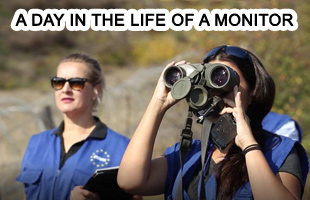Humanitarian- and human rights organizations together with Georgian Government officials agree that the adherence to the principles of human rights constitutes the prerequisite for peace and stability in Georgia after the war last August. They shared their 2009 plans at a seminar held at the EUMM headquarters in Tbilisi on January 15th and positively concluded to step up cooperation by coordinating activities and exchange of information.
The purpose of the seminar was to exchange information on the human rights situation in Georgia and the projected work plans for 2009 with Georgian authorities, different international organizations, agencies, NGOs and Non Governmental Organizations.
The discussion, led by EUMM, was divided into three blocks and one final session and focussed on Internally Displaced Persons, (IDP), returnees and the situation in the zones adjacent to the administrative boundary lines with South Ossetia and Abkhazia, civil society, NGOs and the large donors.
Representatives of more than 18 different organizations, including governmental representatives from the Georgian Ministry of Internal Affairs and the Ministry of Refugees and Accommodation, representatives of different UN Agencies in Georgia, the EU, USAID, Human Rights Watch (HRW), Human Rights Centre (HRC), other NGOs and representatives of the EUMM and Field Offices participated in the Seminar, around 50 people in total.
The first part focussed on IDPs, returnees and the situation in the Adjacent Zones: the representative from the Georgian Ministry of Internal Affairs made a presentation on the situation stating the increase in the number of crimes, armed attacks on policemen, explosions and the possible ethnic cleansing and abuse of the local population by Russian armed forces. The representative of the Ministry of Refugees and Accommodation introduced the Action Plan adopted one week before the August conflict and the fact that it was not implemented due to the new situation. The main challenge is now the lack of harvest and the assistance given to the people to integrate into their new settlements. Finally for the Ministry a priority for 2009 will be giving a voice to IDPs in decision making. Several representatives from UN Agencies: OCHA, UNHCR and UNICEF presented their work and their priorities for 2009 as did NGO SAKHLI, an Advice Centre for Women. The discussion also looked at whether the Law on the Occupied Territories restricted economic activities in these areas. The main problems that were pointed out were the lack of information and the fact that the legal and registration process were going at a slow pace.
The second part focussed on human rights – civil society and NGOs: the main speakers were UNHCHR, UNIFEM, HRC, HRW and GYLA who introduced their work in Georgia and their plans for 2009 as requested. Consolidation of international human rights conventions to national legislation and helping the government to prepare their periodic reports to the treaty bodies are among UNHCHR priorities. Some of the organizations mentioned that not having a monitoring mandate in Georgia proper they have to rely on information from international monitoring presences, where EUMM is very well appreciated, but there was a specific request for more details of EUMM’s work. UNIFEM concentrates on training and information of the women’s network. The HRC said that militarisation of the country is an increasing problem and creating a regional network (Caucasus) of human rights defenders and media monitoring in conflict setting will be this year’s focus. HRW and GYLA will be mainly working on IDPs and returnees and presenting cases of human rights abuses. The discussion also covered other issues including the fact that some examples of hate speech had been found, cooperation among the different organizations and the different forms of assistance from the international community to Georgia.
The third block of the seminar dealt with large donors: the main speakers were USAID and the European Commission. Both organisations gave details of the aid given to Georgia and the need for further cooperation. They raised the fact that in South Ossetia it is more difficult to support local civil society whilst in Abkhazia there are on going projects. It was also felt that a longer term approach was needed instead of ad hoc short term efforts. There were too the obvious difficulties of reaching the conflict affected populations inside South Ossetia and Abkhazia. It was mentioned that even though there are a lot of new problems after August there are also more opportunities, more money, more discussion and greater recognition of the plight of the old IDPs. There was also a reminder that the small scale community based projects had been very successful, funding tied to progress on benchmarks on human rights was important, as was Government accountability.
The final part was a plenary discussion on quick impact projects (QUIPs) and confidence building measures (CBM): the EUMM in its monitoring capacity may act as a catalyst and facilitator to explore avenues of CBM. The aim of this session was to explore possibilities for the implementation of QIPs to address concretely and immediately the plight of IDPs and indentify possibilities for CBM, first in the adjacent zones and when politics and security allows, on both sides of the administrative boundary lines (ABL).
The overall assessment of the seminar was very positive, coordination, information and reporting were the key issues to be improved during 2009.
The discussion, led by EUMM, was divided into three blocks and one final session and focussed on Internally Displaced Persons, (IDP), returnees and the situation in the zones adjacent to the administrative boundary lines with South Ossetia and Abkhazia, civil society, NGOs and the large donors.
Representatives of more than 18 different organizations, including governmental representatives from the Georgian Ministry of Internal Affairs and the Ministry of Refugees and Accommodation, representatives of different UN Agencies in Georgia, the EU, USAID, Human Rights Watch (HRW), Human Rights Centre (HRC), other NGOs and representatives of the EUMM and Field Offices participated in the Seminar, around 50 people in total.
The first part focussed on IDPs, returnees and the situation in the Adjacent Zones: the representative from the Georgian Ministry of Internal Affairs made a presentation on the situation stating the increase in the number of crimes, armed attacks on policemen, explosions and the possible ethnic cleansing and abuse of the local population by Russian armed forces. The representative of the Ministry of Refugees and Accommodation introduced the Action Plan adopted one week before the August conflict and the fact that it was not implemented due to the new situation. The main challenge is now the lack of harvest and the assistance given to the people to integrate into their new settlements. Finally for the Ministry a priority for 2009 will be giving a voice to IDPs in decision making. Several representatives from UN Agencies: OCHA, UNHCR and UNICEF presented their work and their priorities for 2009 as did NGO SAKHLI, an Advice Centre for Women. The discussion also looked at whether the Law on the Occupied Territories restricted economic activities in these areas. The main problems that were pointed out were the lack of information and the fact that the legal and registration process were going at a slow pace.
The second part focussed on human rights – civil society and NGOs: the main speakers were UNHCHR, UNIFEM, HRC, HRW and GYLA who introduced their work in Georgia and their plans for 2009 as requested. Consolidation of international human rights conventions to national legislation and helping the government to prepare their periodic reports to the treaty bodies are among UNHCHR priorities. Some of the organizations mentioned that not having a monitoring mandate in Georgia proper they have to rely on information from international monitoring presences, where EUMM is very well appreciated, but there was a specific request for more details of EUMM’s work. UNIFEM concentrates on training and information of the women’s network. The HRC said that militarisation of the country is an increasing problem and creating a regional network (Caucasus) of human rights defenders and media monitoring in conflict setting will be this year’s focus. HRW and GYLA will be mainly working on IDPs and returnees and presenting cases of human rights abuses. The discussion also covered other issues including the fact that some examples of hate speech had been found, cooperation among the different organizations and the different forms of assistance from the international community to Georgia.
The third block of the seminar dealt with large donors: the main speakers were USAID and the European Commission. Both organisations gave details of the aid given to Georgia and the need for further cooperation. They raised the fact that in South Ossetia it is more difficult to support local civil society whilst in Abkhazia there are on going projects. It was also felt that a longer term approach was needed instead of ad hoc short term efforts. There were too the obvious difficulties of reaching the conflict affected populations inside South Ossetia and Abkhazia. It was mentioned that even though there are a lot of new problems after August there are also more opportunities, more money, more discussion and greater recognition of the plight of the old IDPs. There was also a reminder that the small scale community based projects had been very successful, funding tied to progress on benchmarks on human rights was important, as was Government accountability.
The final part was a plenary discussion on quick impact projects (QUIPs) and confidence building measures (CBM): the EUMM in its monitoring capacity may act as a catalyst and facilitator to explore avenues of CBM. The aim of this session was to explore possibilities for the implementation of QIPs to address concretely and immediately the plight of IDPs and indentify possibilities for CBM, first in the adjacent zones and when politics and security allows, on both sides of the administrative boundary lines (ABL).
The overall assessment of the seminar was very positive, coordination, information and reporting were the key issues to be improved during 2009.
 |
 |
 |
 |
 |
 |
 |
 |
 |
 |
 |
WELCOME SPEECH “Seminar on Human Rights related Programmes”
Gilles Janvier, EUMM Deputy Head of Mission – 15 January, 2009
On behalf of Ambassador Haber, the Head of Mission, absent from the country, I would like to warmly welcome all participants to our Headquarters, in particular the representatives of the Government of Georgia:
- MIA (Ministry of the Interior),
- MRA (Ministry of Refugees and Accommodation),
… welcome also representatives of the UN;
- OCHA (UN Office for the Coordination of Humanitarian Affairs),
- UNHCHR (UN High Commissioner for Human Rights),
- UNHCR (UN High Commissioner for Refugees),
- UNICEF (UN Children's Fund),
- UNIFEM (UN Development Fund for Women),
- and UNOMIG
… welcome to the representative of the
- OSCE, with whom we still share hopes that there will be a turn-around with regard to their involvement in Georgia,
… welcome representatives of the EU;
- EU Commission Delegation & ECHO,
- EU Special Representative for the South Caucasus,
… a special and warm welcome to the representative of the United States;
- US AID,
… a very warm welcome further to the representatives of;
- IOM
- Human Rights Watch,
- Georgian Human Rights Center (HRIDC)/Fidh,
- and the Georgian Young Lawyers Association
Welcome also to our colleagues from the Field Offices, I hope that you all have had a good trip without too many road problems.
“Liberté, Egalité and Fraternité”
My name is Gilles Janvier, I am the Deputy Head of Mission of the EUMM and as such, I am pleased to open this “Seminar on Human Rights related programmes.”
Participants - I am also a former General in the French Gendarmerie and would like to jog your memory and take you back to the motto of the French Revolution; “Liberté, Egalité et Fraternité”, in English; freedom, equality and brotherhood. These notions developed during the age of enlightenment, together with principles of Natural Law, Inalienable Rights and the Rule of Law. The fundaments of many western national constitutions, and indeed constitutions throughout the world, were laid down during those revolutionary times.
In recent European history we can find it back in the Lisbon Treaty, where the preamble recites - ‘DRAWING INSPIRATION from the cultural, religious and humanist inheritance of Europe, from which have developed the universal values of the inviolable and inalienable rights of the human person, freedom, democracy, equality and the rule of law,’
During the French revolutions the stake was the Civil Rights of the French Citizens. Today, Europe’s stakes are higher. Human Rights are part of the Second Pillar of EU policy; the Common Foreign and Security Policy, concerned with foreign policy and military matters. The European Security Strategy clearly defines the aims and priorities of the EU in its external action, and it reiterates that the best means of strengthening the international order, amongst others, include establishing the rule of law and protecting human rights.
The EUMM has been created by the Council of the European Union. Although EUMM is not a Human Rights Mission, Human Rights and Gender are integral parts of the Mission’s mandate. Over the last three months EUMM has monitored, analysed and reported on human rights and the humanitarian situation in the context of the Six-points Agreement. We have gained knowledge and have widened our network and cooperation with many different organizations in the arena.
Today’s event is organized to continue our good cooperation with representatives from the GEO Government and organizations working in the framework of stabilization, normalization and confidence building. We are going to learn from each other what the plans are for this year and how we can all cooperate in a way that may contribute to establish preconditions on the ground that will help politicians from all sides of the conflict to come to a satisfying solution without having to resort to armed force.
The role for EUMM remains to monitor, analyse and report, this of course should include the areas of SO and ABK, and we are steadfastly continuing to search for access to these areas. We look forward to the presentations of other participants and to share thoughts on the activities and cooperation in 2009.
I would like to conclude with an encouragement to all: some people might not see how to reach improvement, they could even think stability in the Caucasus is impossible. To them and to you, let me just quote another French General, and say:
“Impossible: c’est pas Francais!”
I wish you a very fruitful day,
Good luck,
Thank you very much.


